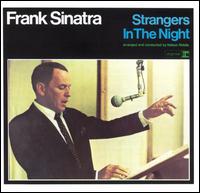| Strangers in the Night | ||||
|---|---|---|---|---|
 | ||||
| Studio album by | ||||
| Released | May 30, 1966 (LP) October 6, 1986 (CD) | |||
| Recorded | April 11 – May 16, 1966, Hollywood | |||
| Genre | Traditional pop, vocal jazz | |||
| Length | 27:10 | |||
| Label | Reprise F 1017 | |||
| Producer | Jimmy Bowen | |||
| Frank Sinatra chronology | ||||
| ||||
| Singles from Strangers in the Night | ||||
| ||||
| Strangers in the Night: Deluxe Edition | |
|---|---|
| Studio album by | |
| Released | January 26, 2010 |
| Recorded | April 11 – May 16, 1966, Hollywood April 18, 1985, Budokan Hall, Tokyo, Japan |
| Genre | Traditional pop, vocal jazz |
| Length | 35:21 |
| Label | Concord |
| Producer | Nelson Riddle, Sonny Burke |
Strangers in the Night is a 1966 studio album by Frank Sinatra. It marked Sinatra's return to number one on the pop album charts in the mid-1960s, and consolidated the comeback he initiated in 1965. Combining pop hits with show tunes and standards, the album bridges classic jazz-oriented big band with contemporary pop. It became Sinatra's fifth and final album to reach number one on the US Pop Albums Chart. Additionally, the single "Strangers in the Night" reached number one on the pop single charts, while "Summer Wind" has become one of Sinatra best-known songs, making numerous film and television appearances in the years since its release.
Contents
At the Grammy Awards of 1967 Sinatra garnered two Grammys for his efforts on this album, including the Record of the Year for the title track, as well as Best Male Vocal Performance for the same song. (He also won a further Grammy that same year, the Album of the Year for A Man and His Music ). Ernie Freeman's arrangement of the title track won him the Grammy Award for Best Arrangement Accompanying a Vocalist or Instrumentalist, and Eddie Brackett and Lee Herschberg's engineering earned them the Grammy Award for Best Engineered Album, Non-Classical.
This is the final album Sinatra performed with long-time arranger/conductor Nelson Riddle and his orchestra.
Strangers in the Night has been certified platinum for one million copies sold in the US. Aside from his Christmas output, it remains Sinatra's only solo studio album to achieve this certification to date.
On 26 January 2010 the album was reissued as a "Deluxe Edition" which included three bonus tracks (two recorded tracks of "Strangers in the Night" and "All or Nothing at All" performed at the Budokan Hall from 1985, and an alternate take of "Yes Sir, That's My Baby"). In this 2010 version the audio channels are inverted.
| Review scores | |
|---|---|
| Source | Rating |
| AllMusic (1966 original) | |
| Record Mirror | |